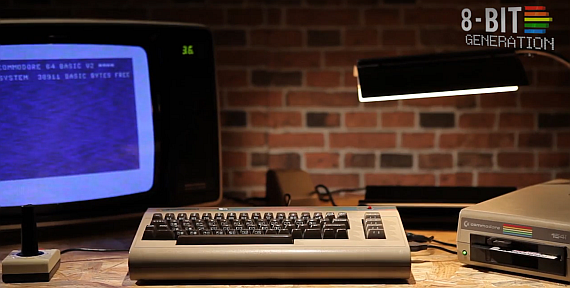I like retro computing – I grew up on Apple II computers at my school and an Atari 800 computer at home, with a Commodore 84 & Atari ST at the houses of relatives so in addition to watching YouTube channels dedicated to old computers and games like PixelMusement and Lazy Game Reviews, I also love documentaries about the history of computing like Triumph of the Nerds and Revolution OS (which I think I reviewed on a previous blog, but which I am currently unable to find). When I found about about this particular documentary on the history of Commodore, I was very interested in checking it out.
The 8-Bit Generation focuses almost exclusively on Commodore computers, with a perspective from within the company, and in particular from the view of Jack Tramiel and his boosters within Commodore. From the view of this documentary, with Jack at the helm, Commodore can do no wrong, and their opponents could do no right. Apple never gained any real market share while Commodore dominated the market (Wrong – the Apple IIe was solid rival for Commodore), Atari had no 3rd party publishers and actively fought them for the PC (Wrong – their main opposition to 3rd party publishers was on the video game console front, they had plenty of 3rd party developers and publishers for PC), and once Jack was ousted from Commodore, they never accomplished anything ever again (Wrong – The Amiga says “Hi!”). Particularly damning is the claim that Atari didn’t get VisiCalc until a year after Commodore did, which is clearly false.
It’s really rather disappointing. While the documentary has interviews with Tramiel himself, I get the strong impression that the reason the director was able to get these interviews in the first place because they were already a booster of Tramiel. The majority of the interview footage comes from Commodore employees and Tramiel supporters, with the only exceptions from that being a brief interview with Howard Scott Warshaw about Atari Corporate culture (which appears to lean towards the 2600 and the home games division), and an tragically even more brief interview with Steve Wozniak.
For a documentary that bears the title of The 8-Bit Generation, and which does give a fair amount of time on the MOS Technologies 6510 processor architecture, it is a very strong disappointment that the film wears its slant on its sleeve, and I think it’s very much to the detriment of the film. I’d really have enjoyed a more even-handed take on the various systems from this computer generation, with a serious take given on, for example, the TRS-80 and the TI-99. Instead, we get a pep rally for the Commodore 64, with some flagrant mis-truths. I wanted to like this documentary, but I cannot recommend it in the slightest.
If you do decide to get this documentary in spite of my recommendation to the contrary, it is available from Amazon.com.

